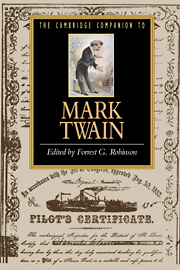Book contents
- Frontmatter
- 1 Mark Twain as an American Icon
- 2 The Innocent at Large
- 3 Mark Twain and Women
- 4 Mark Twain's Civil War
- 5 Banned in Concord
- 6 Black Critics and Mark Twain
- 7 Mr. Clemens and Jim Crow
- 8 Speech Acts and Social Action
- 9 How the Boss Played the Game
- 10 Mark Twain's Travels in the Racial Occult
- 11 Mark Twain's Theology
- Further Reading
- Index
- Continued Series List
10 - Mark Twain's Travels in the Racial Occult
Following the Equator and the Dream Tales
Published online by Cambridge University Press: 28 May 2006
- Frontmatter
- 1 Mark Twain as an American Icon
- 2 The Innocent at Large
- 3 Mark Twain and Women
- 4 Mark Twain's Civil War
- 5 Banned in Concord
- 6 Black Critics and Mark Twain
- 7 Mr. Clemens and Jim Crow
- 8 Speech Acts and Social Action
- 9 How the Boss Played the Game
- 10 Mark Twain's Travels in the Racial Occult
- 11 Mark Twain's Theology
- Further Reading
- Index
- Continued Series List
Summary
Mark Twain was always intensely engaged by two important nineteenth-century cultural conversations, one addressing issues of race, the other theories of the unconscious. His later writings in particular are known both for their explicit anti-imperialism, and the charged racial awareness it produced, and for their flirtation with spiritualism, dream theory, and a variety of occult phenomena. Each of these cultural arenas, the racial and the psychological, has been recognized individually as a major force shaping Twain's imagination, but how they might have interacted to produce his large body of late, mostly unfinished (and some unpublished) writings has yet to be determined. The later works, the group of fantastic, quasiphilosophical pieces, now published in volumes with such titles as Which Was the Dream? and Other Symbolic Writings of the Later Years and Mark Twain's Fables of Man, all written around the time of Twain's 1895-6 world lecture tour and after, are themselves part of the challenge, in that they have always raised for readers and scholars a range of fundamental problems: at issue are their textual status and generic location, their aesthetic “incoherence,” and their apparent “retreat” from both the humor and the social and political engagement that make Mark Twain one of our bestloved national authors.
- Type
- Chapter
- Information
- The Cambridge Companion to Mark Twain , pp. 193 - 219Publisher: Cambridge University PressPrint publication year: 1995
- 2
- Cited by

